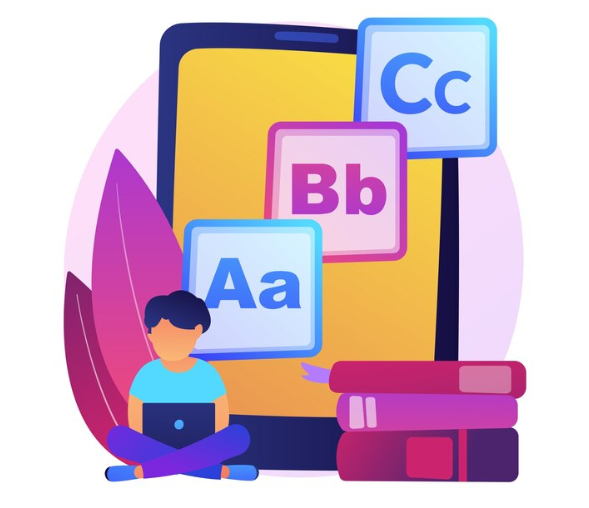How Can I Improve My English Online: Level Up Your Language Skills
Contents
- Can I Improve My English Skills By Myself?
- How Can I Learn to Speak English Fluently Online?
- Step 1: Make a Commitment
- Step 2: Explore Different Learning Materials
- Step 3: Engage Actively
- Step 4: Practice Pronunciation
- Step 5: Review Regularly
- Step 6: Seek Personalised Guidance
- What Should Be Covered While Learning English?
- Which App is the Most Useful for Learning English?
- Which Website is the Best For Improving English?
- Final Thoughts: Empowering Your Language Learning Journey with Clapingo
- FAQs

English proficiency is the passport to success in today's competitive world. In India, where multilingualism is a norm, English holds a special place - it bridges state borders, powers trade, and unlocks global opportunities. Yet for many, mastering this language remains an uphill task.
Non-native speakers often hit roadblocks while learning English. Traditional classrooms may seem intimidating or inaccessible due to geographical constraints. Grammar rules may be challenging to grasp and the fear of mispronunciation can create self-doubt. Juggling professional obligations alongside language classes can also prove challenging.
Enter online learning - a flexible, efficient solution for those pondering about how to improve their English at home. It lets you learn at your own pace, from the comfort of your home or on-the-go during breaks at work. With resources available 24/7 online, you can revisit lessons whenever you need and practice until perfect.
This blog post is your comprehensive guide to improving your English skills online. We will delve into common challenges faced by non-native speakers in India and how to tackle them effectively. We'll discuss the benefits of online learning platforms like apps and websites, explore personalised coaching options and help you navigate through the digital labyrinth of resources. Lastly, we'll share tips on maintaining consistency in learning and boosting overall fluency.
So get ready to embark on an exciting journey towards perfecting your spoken English! Let's dive in!
Can I Improve My English Skills By Myself?
Absolutely, you can improve your English by yourself! The digital age has ushered in an era of unprecedented accessibility to resources and learning tools, making self-study a viable option. Being able to learn at your own pace offers convenience and flexibility that aligns with your schedule and personal learning style.
Self-study methods come with their pros and cons. On the bright side, you get to set your own pace, choose your learning materials, and focus on areas you find challenging. This ensures a personalised approach that caters to your specific needs. However, it requires self-discipline, consistency, and motivation to stay on track.
To optimise the benefits of self-learning, start by creating a study plan. Here’s a simple guide:
Set clear goals: Define what you want to achieve - be it improving vocabulary, enhancing pronunciation or mastering grammar.
Allocate Time: Dedicate specific hours each day for focused study.
Choose Resources: Select books and media that suit your level and interest.
Practice Regularly: Incorporate English into daily life - read newspapers, watch movies or converse in English as much as possible.
Review & Adjust: Regularly assess your progress and tweak the plan accordingly.
If you are still worrying about whether you can improve your English skills, the following section will provide you with a detailed explanation of the practical steps involved in self-learning English skills. You can also seek guidance from a myriad of resources available online that can aid your self-learning journey. Classic books like Word Power Made Easy can help build vocabulary while podcasts like BBC Learning English can help enhance listening skills.
How Can I Learn to Speak English Fluently Online?

Learning to speak English fluently online isn't rocket science, but a journey that requires dedication, practice, and the right strategy. Let's take a look at some practical steps you can take to enhance your language skills from the comfort of your home.
Step 1: Make a Commitment
Determination is the foundation of learning any new skill, including English. Set aside dedicated time each day for English practice. Remember, consistency is the key - practising regularly even for short periods can work wonders on your fluency!
Step 2: Explore Different Learning Materials
The internet offers a goldmine of resources to learn English:
Videos: Visual aids help in understanding context and pronunciation. YouTube is loaded with channels providing free English lessons. BBC Learning English focuses on everyday phrases and Oxford Online English covers grammar topics.
Audio: Podcasts and audiobooks allow you to listen and learn from native speakers. Try listening to BBC World Service for global perspectives or Luke's ENGLISH Podcast for a friendly approach.
Reading Materials: Websites like British Council or Cambridge Dictionary offer articles, stories, and grammar guides suited to different levels of proficiency.
Step 3: Engage Actively
Active use of the language is integral to learning it fluently. Here are some ideas:
Interact with people online in English. Joining communities like English Language Learners Stack Exchange or language exchange apps like Tandem can provide such opportunities.
Start thinking in English. It may be tough initially, but it helps in internalising the language and improving fluency.
Write daily. Be it emails, social media posts, or a personal diary - writing provides a practical way to implement what you learn.
Step 4: Practice Pronunciation
One major hurdle for non-native speakers is mastering pronunciation. Online resources can resolve this issue:
Pronunciation guides on Forvo can help you pick up correct pronunciations of individual words.
Interactive phonetics charts like the one on the International Phonetic Alphabet (IPA) can assist in understanding sounds associated with different letters.
Step 5: Review Regularly
Revising what you’ve learned is crucial for retaining knowledge. Use flashcards for vocabulary and revisit grammar lessons periodically to keep them fresh in your mind.
Step 6: Seek Personalised Guidance
Supplementing self-learning with professional guidance can fast-track your progress. Platforms like Clapingo offer personalised coaching sessions with native English speakers, enabling users to improve their fluency, pronunciation, vocabulary, and sentence structure effectively.
Remember, improving English fluency is a gradual process that demands patience and commitment. Happy learning!
What Should Be Covered While Learning English?
Learning English effectively involves honing your vocabulary, grammar, pronunciation, and listening skills. If you are worried about how to improve your English skills at home, familiarise yourself with these aspects and their corresponding learning strategies:
Vocabulary Enhancement
Mastering vocabulary is paramount for effective communication. Try the following strategies to boost your word bank:
1. Read Regularly: Newspapers, books, or blogs can introduce you to new words. You can start with The Hindu Editorial which enhances your knowledge while learning new words.
2. Use Vocabulary Apps: Apps like Memrise make learning fun with their game-based approach.
3. Flashcards: Write down new words along with their meanings and synonyms on flashcards for easy recall.
Understanding Grammar
Good grammar is the backbone of any language. Start with the basics like tenses, prepositions, articles, etc., and gradually move on to complex structures. Practice by writing sentences or paragraphs using the grammatical rules you've learned. Here are some online resources for self-study:
British Council Grammar Exercises
GrammarBook
You can check out this Clapingo article for more suggestions on improving grammar: Unlocking the Secrets of English Grammar: A Practical Guide
Pronunciation
Correct pronunciation can make your spoken English more understandable and effective. Practice sounds that are not present in your native language. Listen to native speakers and mimic their accents. Some useful resources to improve pronunciation are BBC Learning English Pronunciation and Sounds The Pronunciation App by Macmillan English.
Listening Skills
Enhancing your listening skills allows you to understand spoken English better. Try these resources:
1. Audiobooks: Websites like [Open Culture] offer free audiobooks.
2. Podcasts: Podcasts like [BBC Learning English] provide interesting content for English learners.
3. YouTube Channels: Channels like [EnglishClass101] offer various video lessons for English learning.
Remember, learning English is a gradual process, so don't rush yourself. Take one step at a time and soon, you'll see substantial improvement in your language skills. Stay persistent, keep practising, and you will master the language before you know it!
Which App is the Most Useful for Learning English?

With a plethora of English learning apps available, it can be daunting to choose the one best suited to your needs. To simplify your decision, we've put together a comparison table detailing features, pros, and cons of popular language learning apps such as Duolingo, Rosetta Stone, Babbel etc.
App | Features | Pros | Cons |
Duolingo | Gamified language learning with lessons in grammar and vocabulary. | Free access, engaging content and user-friendly interface. | Less focus on conversation skills; ads in the free version can be distracting. |
Rosetta Stone | Comprehensive language learning with emphasis on pronunciation, reading, writing and speaking. | Immersive methodology and speech recognition technology for pronunciation correction. | More expensive and requires a consistent time commitment. |
Babbel | Interactive dialogues and review sessions for understanding sentence construction and improving fluency. | Practical real-world scenarios; progress tracking feature. | Fee-based after initial lessons. More beneficial for intermediate learners rather than beginners. |
Hello English | Tailored towards learners who want to learn English from scratch or improve skills. | Uses interactive games for teaching grammar rules and vocabulary. | The interface is not very user-friendly. Not enough emphasis on spoken English. |
Each app has its unique strengths and could be used in conjunction depending on your specific learning goals and current proficiency level.
Now that you have a better idea about these apps' offerings, don't forget to check out our detailed guide on 11 Of The Best Apps For Improving Your English Speaking Skills. Choose the app that matches your requirements the most and start learning. Always remember that consistent practice is key to mastering any language!
Which Website is the Best For Improving English?
The internet is brimming with resources, and we have discussed quite a few of them in this blog. But, finding a platform tailored to the unique needs of Indian non-native English speakers can be challenging.
Your search for an ideal platform should focus on a few crucial features:
1. Comprehensible Lessons: The material should be easy to understand, with lessons broken down into manageable sections.
2. Interactive Content: Look for websites offering engaging activities like quizzes and interactive speaking tasks.
3. Native Speaker Involvement: Platforms that involve native speakers as tutors offer an authentic learning experience.
4. Flexible Timings: Opt for learning platforms that allow you to schedule sessions according to your convenience.
Among the plethora of learning platforms, Clapingo stands out as a preferred choice for many Indian professionals aiming to master the English language. With its personalised coaching sessions conducted in learners' native languages, it breaks down the language barrier effectively. The one-on-one classes focus on pronunciation, vocabulary and sentence structure, aiming at overall fluency.
Moreover, Clapingo also offers flexible session scheduling and a structured 5-step course adaptable to individual learner's needs. As a bonus, getting guidance from native English speakers provides learners with practical insights into colloquial terms and phrases.
In addition to dedicated platforms like Clapingo, there are several free online courses for enhancing your spoken English skills as well. You can check out our list of Top 15 Free Online Courses For English Speaking that cater specifically to non-native speakers in India.
Remember, improving your English online requires dedication and consistent practice alongside utilising these resources effectively!
Final Thoughts: Empowering Your Language Learning Journey with Clapingo
In this enriching journey through the intricacies of the English language, we've explored various strategies to enhance your English skills online. From harnessing digital platforms to looking at interactive learning modes, it's evident that improving English online is a feasible goal for every individual.
Remember, language learning is not a sprint; it’s more like a marathon. Each word you learn, each sentence you utter, and the confidence you gain along the way, all contribute to your overall progress. Persistence is key. Don't be disheartened by initial speed bumps; instead, view them as stepping stones towards fluency.
As we wrap up this guide, let's revisit the potential that lies in personalised English coaching. Platforms like Clapingo open up an efficient avenue for improving English online. With one-on-one sessions facilitated by native speakers who coach in your native language, they offer an environment conducive to effective learning.
The structured 5-step course offered by Clapingo ensures you enhance all aspects of spoken English - from fluency and pronunciation to vocabulary and sentence structure. It's an adaptable and flexible plan that fits seamlessly within your schedule.
Enhancing one's English skills isn't just about mastering a foreign tongue; it's about broadening horizons and breaking down barriers. It’s about gaining access to a world where language is no longer an obstacle but a stepping stone towards success.
So why wait? Take this opportunity to turn challenges into triumphs with these strategies coupled with Clapingo’s offerings. The journey may seem daunting initially, but remember – every step you take brings you closer to becoming a confident communicator in English!
Embrace your journey towards improved spoken English skills with enthusiasm and dedication. And remember – every little bit helps on your path towards mastering this universal language!
FAQs
1. How can I improve my English speaking skills online?
The internet offers a plethora of resources! You can start by listening to English podcasts, watching movies, and participating in interactive language learning games. For a more focused approach, consider opting for personalised online courses like Clapingo, where you'll have one-on-one conversations with native speakers.
2. How much time should I dedicate daily to improve my spoken English?
Consistency is key. Spending even 15-20 minutes a day can significantly improve your fluency over time. You could use this time for activities like talking to a language partner, watching an English show, or participating in an online lesson at Clapingo.
3. Can I improve my English pronunciation online?
Definitely! Online resources like YouTube are a goldmine of pronunciation guides and accent training videos. If you are looking for personalised feedback and corrections, consider enrolling with platforms like Clapingo that provide one-on-one coaching with native speakers who can pinpoint your pronunciation mistakes and help you rectify them.
Comments
Your comment has been submitted